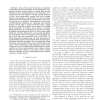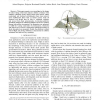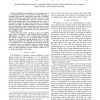ICRA
2010
IEEE
15 years 20 days ago
2010
IEEE
— We demonstrate five-degree-of-freedom (5-DOF) wireless magnetic control of a fully untethered microrobot (3DOF position, 2-DOF pointing orientation). The microrobot can move t...
144
click to vote
ICRA
2010
IEEE
15 years 20 days ago
2010
IEEE
— One of the main drawbacks of standard visual EKF-SLAM techniques is the assumption of a general camera motion model. Usually this motion model has been implemented in the liter...
103
click to vote
ICRA
2010
IEEE
15 years 20 days ago
2010
IEEE
— This paper presents a new paradigm in the design of indoor flying robots that replaces collision avoidance with collision robustness. Indoor flying robots must operate within...
ICRA
2010
IEEE
15 years 20 days ago
2010
IEEE
— Introducing autonomous machines to construction areas can improve many of the occurring processes. Therefore, this paper deals with problems in the field of creating an autono...
130
click to vote
ICRA
2010
IEEE
15 years 20 days ago
2010
IEEE
Abstract— To compute collision-free and dynamicallyfeasibile trajectories that satisfy high-level specifications given in a planning-domain definition language, this paper prop...
117
click to vote
ICRA
2010
IEEE
15 years 20 days ago
2010
IEEE
Abstract— Trajectory planning and optimization is a fundamental problem in articulated robotics. It is often viewed as a two phase problem of initial feasible path planning aroun...
99
Voted
ICRA
2010
IEEE
15 years 20 days ago
2010
IEEE
Abstract— A core challenge in probabilistic mapping is to extract meaningful uncertainty information from data registration methods. While this has been investigated in ICP-based...
126
click to vote
ICRA
2010
IEEE
15 years 20 days ago
2010
IEEE
— Simultaneous localization and mapping (SLAM) is a prominent feature for autonomous robots operating in undefined environments. Applications areas such as consumer robotics app...
115
click to vote
ICRA
2010
IEEE
15 years 20 days ago
2010
IEEE
— Bipedal walking could be implemented into a robot by mimicking spring-like leg behaviour. The fundamental model, describing human-like leg function in walking is the bipedal sp...
110
click to vote
ICRA
2010
IEEE
15 years 20 days ago
2010
IEEE
— Within the research on Micro Aerial Vehicles (MAVs), the field on flight control and autonomous mission execution is one of the most active. A crucial point is the localizati...



